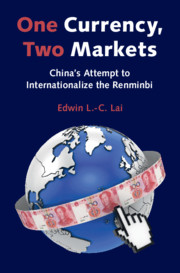Book contents
- One Currency, Two Markets
- One Currency, Two Markets
- Copyright page
- Dedication
- Contents
- Figures
- Tables
- Boxes
- Preface
- Acknowledgments
- A Short Summary of This Book
- Abbreviations
- 1 Introduction
- 2 China’s Aversion to a Floating Exchange Rate
- 3 Why Does China Want to Internationalize the RMB?
- 4 China’s Strategy of Internationalizing the RMB
- 5 The Importance of Capital Account Liberalization
- 6 The Importance of Financial Sector Reform
- 7 The Importance of the Offshore RMB Market
- 8 The Potential of the RMB as a Payment Currency
- 9 The Prospects of RMB Internationalization
- References
- Further Reading
- Index
6 - The Importance of Financial Sector Reform
Published online by Cambridge University Press: 17 June 2021
- One Currency, Two Markets
- One Currency, Two Markets
- Copyright page
- Dedication
- Contents
- Figures
- Tables
- Boxes
- Preface
- Acknowledgments
- A Short Summary of This Book
- Abbreviations
- 1 Introduction
- 2 China’s Aversion to a Floating Exchange Rate
- 3 Why Does China Want to Internationalize the RMB?
- 4 China’s Strategy of Internationalizing the RMB
- 5 The Importance of Capital Account Liberalization
- 6 The Importance of Financial Sector Reform
- 7 The Importance of the Offshore RMB Market
- 8 The Potential of the RMB as a Payment Currency
- 9 The Prospects of RMB Internationalization
- References
- Further Reading
- Index
Summary
In Chapter 6, I discuss the importance of financial sector reform, focusing on the banking sector, the bond market, and the stock market. The banking sector is still characterized by financial repression. The largest banks are all state-owned, the interest rates are not market-determined, and state-owned enterprises (SOEs) still enjoy preferential access to credits compared with the private sector. The bond market developed only recently. Most important developments in the Chinese bond market happened only since about 2015. China’s bond market is characterized by its relatively small size relative to its GDP, low turnover ratio, and low foreign ownership. The central government bond market, which is most important for the internationalization of the RMB, needs to be much further developed in order to the pave way for the RMB to serve as a significant reserve currency. The market capitalization of the stock market is small relative to the GDP of China. It is characterized by low fund-raising capacity, excessive government intervention, lack of transparency, capital controls, and other issues. The good news for the financial market is that market opening and integration with the rest of the world did not slow down in recent years.
Keywords
- Type
- Chapter
- Information
- One Currency, Two MarketsChina's Attempt to Internationalize the Renminbi, pp. 138 - 193Publisher: Cambridge University PressPrint publication year: 2021

